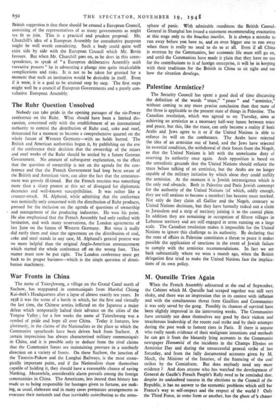War Fronts in China
The name of Taierchwang, a village on the Grand Canal north of Suchow, has reappeared in communiqués from Marshal Chiang Kai-shek's Headquarters after a lapse of almost exactly ten years. In 1938 it was the scene of a battle in which, for the first and virtually the last time, the Chinese armies inflicted on the Japanese a major defeat which temporarily halted their advance on the cities of the Yangtse Valley ; for a few weeks the name of Taierchwang was a symbol of pride and hope all over China. Today it features, less gloriously, in the claims of the Nationalists as the place to which the Communist spearheads have been driven back from Suchow. A certain imprecision has always characterised military communiques in China, and it is possible only to deduce from the rival claims that the Communist forces are maintaining pressure in a southerly direction on a variety of fronts. On these Suchow, the junction of the Tientsin-Pukow and the Lunghai Railways, is the most strate- gically important point, and if the Nationalists show themselves capable of holding it, they should have a reasonable chance of saving Nanking. Meanwhile, considerable alarm prevails among the foreign communities in China. The Americans, less inured than history has made us to being responsible for hostages given to fortune, arc mak- ing, as usual, elaborate and in many cases premature arrangements to evacuate their nationals and thus inevitably contributing to the atmo-
sphere of panic. With admirable sturdiness 'the British Consul- General in Shanghai has issued a statement recommending evacuation at this stage only to the bouches inutiles. It is always a mistake to run away before you have to, and an even bigger one to run away when there is really no need to do so at all. Even if all China is overrun by the Communists, her economic life must still go on, and until the Communists have made it plain that they have no use for the contributions to it of foreign enterprise, it will be in keeping with their traditions for the British in China to sit tight and see how the situation develops.


































 Previous page
Previous page